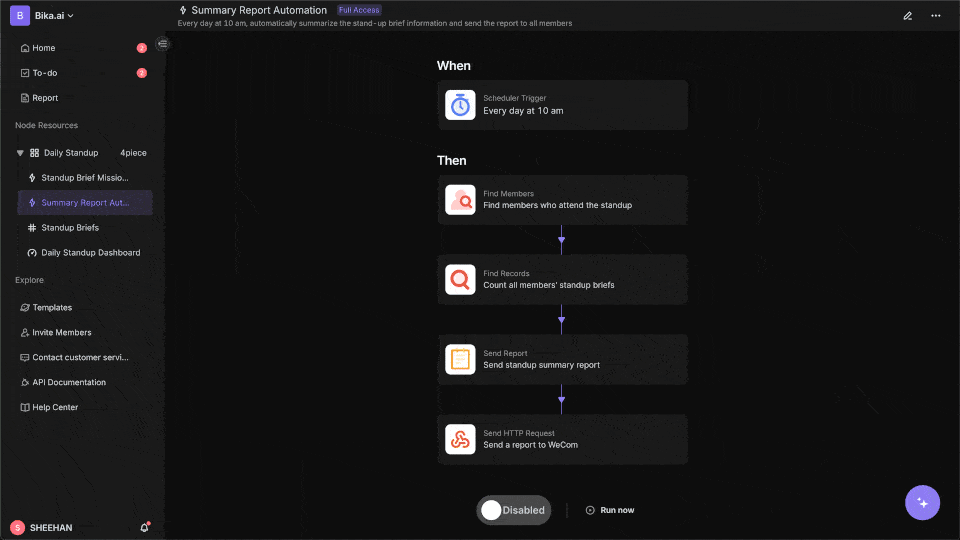
Grow Faster, Work Less: Top Marketing Automation Tools for Startups
Why Marketing Automation is Crucial for Startups in 2025
In 2025, startups are navigating a highly competitive business landscape. With limited budgets and small teams, the need for rapid growth is more pressing than ever. Marketing is a cornerstone of this growth, but traditional manual marketing processes can be time - consuming and resource - intensive, often stretching startups thin.
Marketing automation refers to the use of software platforms and technologies to automate repetitive marketing tasks. These tasks can range from email marketing and social media posting to lead nurturing and customer segmentation. The core purpose is to streamline marketing processes, allowing businesses to focus on more strategic initiatives.
For startups, marketing automation tools for start - ups offer a plethora of benefits. Firstly, efficiency is significantly enhanced. Repetitive tasks such as sending welcome emails, follow - up messages, or scheduling social media posts can be automated, freeing up valuable time for the marketing team to focus on creative and high - level strategies.
Secondly, consistent lead nurturing becomes possible. Startups can set up automated workflows that engage leads at every stage of the sales funnel. For example, based on a lead's behavior, such as website visits or content downloads, personalized emails can be sent at the right time, increasing the likelihood of conversion.
Personalized communication is another key advantage. Marketing automation tools can analyze customer data to create targeted messages. This means that startups can deliver relevant content to different segments of their audience, improving customer engagement and brand loyalty.
Data - driven decisions are also facilitated. These tools provide detailed analytics on marketing campaigns, such as open rates, click - through rates, and conversion rates. Startups can use this data to optimize their marketing strategies, allocate resources more effectively, and ultimately drive growth.
Finally, scalability is a major benefit. As startups grow, their marketing needs become more complex. Marketing automation tools can easily scale with the business, handling increased volumes of leads, customers, and marketing activities without a proportional increase in resources.
:::: key-takeaways ::::
- Marketing automation boosts efficiency by automating repetitive tasks, saving time for strategic marketing efforts.
- It enables consistent lead nurturing, increasing conversion chances through well - timed, personalized communication.
- Startups can make data - driven decisions, optimizing strategies based on analytics provided by these tools. ::::
Top Marketing Automation Tools for Startups
In this section, we'll explore a curated list of leading marketing automation tools suitable for startups. These tools have been selected based on their functionality, ease of use, and cost - effectiveness, making them ideal for early - stage businesses.
Brevo
Brevo is a comprehensive marketing automation platform that offers a wide range of features. Its core strength lies in its email marketing capabilities, which are both powerful and user - friendly. It's an excellent choice for startups that are looking to build and grow their email subscriber base.
Key features include a drag - and - drop email editor, allowing non - technical users to create professional - looking emails easily. It also offers CRM integration, enabling startups to track customer interactions and manage leads effectively. Landing page creation is another useful feature, helping startups generate leads directly from their marketing campaigns. Analytics are built - in, providing insights into campaign performance.
The pricing model is relatively affordable, with a free plan available for startups just getting started. However, as the business grows and more advanced features are required, there are paid plans that offer additional functionality. One potential limitation is that for very large - scale operations, some users may find the platform's advanced features a bit limited compared to more enterprise - level solutions.
 https://www.brevo.com/
https://www.brevo.com/
HubSpot
HubSpot is a well - known name in the marketing automation space. It offers an all - in - one solution that encompasses marketing, sales, and customer service. This makes it a great fit for startups that are looking to integrate different aspects of their customer - facing operations.
Its key features include a robust lead scoring system, which helps startups prioritize leads based on their likelihood to convert. The email marketing module is highly customizable, with advanced segmentation options. HubSpot also has a powerful CRM system, allowing for seamless tracking of customer interactions. Additionally, it provides in - depth analytics and reporting, enabling data - driven decision - making.
The platform is known for its user - friendly interface, but it can be a bit pricier compared to some other options, especially for startups on a tight budget. However, the value it provides in terms of integration and comprehensive functionality may justify the cost for many growing startups.
 https://www.hubspot.com/
https://www.hubspot.com/
Customer.io
Customer.io is focused on customer engagement and retention. It's particularly well - suited for startups that want to deliver highly personalized messages to their customers at the right time.
One of its core features is its ability to trigger emails based on user behavior. For example, if a user abandons a shopping cart on an e - commerce site, Customer.io can send a targeted email to encourage them to complete the purchase. It also offers advanced segmentation based on customer data, allowing for highly personalized messaging. The platform has a clean and intuitive interface, making it easy for startups to set up and manage their campaigns.
However, it may not be the best fit for startups that are primarily focused on broad - scale marketing campaigns rather than individual customer engagement. Also, the pricing can be a bit steep for very early - stage startups with limited resources.
 https://customer.io/
https://customer.io/
Mailchimp
Mailchimp is a popular marketing automation tool, especially known for its email marketing capabilities. It's a great option for startups that are looking for an easy - to - use platform with a wide range of templates and features.
Key features include a vast library of email templates, making it simple to create engaging emails even for those with no design experience. It offers basic CRM functionality, allowing startups to manage their contacts and track interactions. Mailchimp also has social media integration, enabling cross - channel marketing. The platform has a relatively affordable pricing structure, with a free plan available for small - scale operations.
One drawback is that some of the more advanced marketing automation features may require upgrading to a higher - tier plan. Also, for startups that need very complex segmentation and personalization, the platform may have some limitations.
 https://mailchimp.com/
https://mailchimp.com/
Essential Features to Look for in Marketing Automation Tools for Your Startup
When choosing marketing automation tools for start - ups, several factors need to be considered.
Ease of Use/User Interface: Startups often have limited technical resources. A tool with an intuitive user interface, like those of Brevo and Mailchimp, will enable the marketing team to quickly get up to speed and start using the tool effectively without extensive training.
Pricing/Scalability: Given the budget constraints of startups, pricing is a crucial factor. Look for tools that offer freemium models, such as Brevo and Mailchimp, which allow startups to start using the tool for free and then upgrade as their needs grow. Scalability is also important; the tool should be able to handle an increasing volume of leads, customers, and marketing activities as the startup expands.
Core functionalities: Email marketing is a must - have for most startups. Tools like HubSpot, Brevo, and Mailchimp offer robust email marketing features. Lead scoring, as seen in HubSpot, helps prioritize leads. CRM integration is also essential, enabling seamless communication between marketing and sales teams. Analytics are crucial for measuring the success of marketing campaigns and making data - driven decisions.
Integration capabilities: Startups usually use a variety of other tools, such as CRM systems, sales tools, and website builders. A marketing automation tool that can integrate well with these existing systems, like HubSpot with its all - in - one approach, will ensure a smooth flow of data and operations.
Customer Support & Resources: In case of any issues or questions, having access to good customer support is vital. Look for tools that offer comprehensive documentation, tutorials, and responsive customer support teams.
Beyond Standalone Tools: Elevating Marketing Automation with Workflow Integration
While marketing automation tools handle specific tasks efficiently, the real power lies in connecting and automating marketing workflows. Platforms like Bika.ai can take marketing automation to the next level by orchestrating complex, cross - platform campaigns.
For example, Bika.ai can ensure deeper personalization by integrating data from different sources. It enables seamless data flow between systems, such as from a CRM to email marketing or from sales to marketing. This means that customer information can be used in real - time to create more targeted and relevant marketing messages.
Automated customer journeys can be created, where customers are guided through a series of interactions with the brand, from initial awareness to purchase and post - purchase follow - up. This not only improves the customer experience but also increases the efficiency of marketing operations.

Real - World Automation: The Bika.ai AI Automated X Tweets Template for ``
The AI Automated X Tweets Template is a powerful example of how Bika.ai can enhance marketing automation for startups. Managing an X (Twitter) account is a time - consuming task for startups, especially when it comes to maintaining a consistent posting schedule.
Normally, posting tweets requires daily manual effort, which can be disrupted by other business tasks. With this template, startups can streamline the process. It allows for the scheduling and automation of tweets, ensuring regular posting without daily intervention.
The template works by using a database, "X Tweet Content", to store pre - written tweets along with their scheduled posting dates. An automation task, "AI Automated X Tweets", runs daily at 10:00 AM. It retrieves the tweets scheduled for that day from the database and posts them to the X (Twitter) account via the X API.
For startups, this template can be used in various ways. For instance, when launching a product announcement, tweets can be pre - written and scheduled in advance. Social media managers can use it to ensure a consistent stream of promotional tweets, boosting brand awareness. It can also be used to automate customer engagement by scheduling tweets that respond to common customer inquiries or share user - generated content.
The steps to use the template are straightforward. First, install the template into your space. If managing multiple X accounts, you can install it multiple times. Then, add new tweets to the "X Tweet Content" database, specifying the tweet text and the posting date. After that, configure the automation settings, including setting the trigger time for tweet posting, retrieving the scheduled tweets, and setting up the actions for posting. Test the automation to ensure it works correctly, and then enable it.
This template is ideal for social media managers, businesses looking to automate their marketing campaigns, and individuals or influencers aiming to increase their social media presence. Its key features include consistency in posting, time - saving by eliminating manual effort, increased engagement through regular posts, and efficiency in reducing posting errors.
By using this template, startups can enhance the value of their existing marketing automation tools for start - ups. It becomes part of a more intelligent, automated system that can drive better results.

Try the AI Automated X Tweets Template
Conclusion: Powering Your Startup's Growth with Smart Automation
Marketing automation tools have the transformative power to help startups overcome their resource limitations and achieve rapid growth. By choosing the right tools, such as Brevo, HubSpot, Customer.io, or Mailchimp, startups can streamline their marketing processes, engage leads effectively, and make data - driven decisions.
However, to truly maximize the impact, integrating these tools with platforms like Bika.ai is essential. Bika.ai not only enhances the capabilities of individual marketing automation tools but also enables the creation of complex, automated workflows that can take a startup's marketing to new heights.
We encourage you to explore Bika.ai and its various templates, such as the AI Automated X Tweets template, to build custom automations and achieve unprecedented marketing efficiency.

FAQ
Q: Which marketing automation tool is best for a startup with a very limited budget? A: Brevo and Mailchimp are good options as they offer free plans. Brevo has a free plan that provides basic email marketing and some CRM integration features. Mailchimp also has a free plan with access to a wide range of email templates and basic contact management, making them suitable for startups on a tight budget.
Q: How can Bika.ai enhance the marketing automation tools I already use? A: Bika.ai can enhance existing marketing automation tools by orchestrating cross - platform campaigns. It enables seamless data flow between different systems, allowing for deeper personalization. For example, it can use data from your CRM (integrated with your marketing automation tool) to create more targeted email campaigns. It also automates complex customer journeys, increasing the efficiency of your overall marketing operations.
Q: Can the AI Automated X Tweets template be customized for different types of tweet campaigns?
A: Yes, the AI Automated X Tweets template can be customized. You can add new tweets with different content for various campaigns, such as product announcements, contests, or industry news sharing. You can also adjust the posting schedule by modifying the Posting Date in the "X Tweet Content" database. Additionally, if a campaign requires media files, you can configure the "X (Twitter) - Upload Media Files" action accordingly.

Recommend Reading
- Which AI Content Detector is Right for You? A 2025 Comparison
- Beyond Scheduling: How AI Calendar and Product Feedback Analysis Drive Business Growth
- Elevate Your Presentations: The Best Presentation Software Alternatives to PowerPoint in 2025
- Elevate Your Presentations: The Best Presentation Software Alternatives to PowerPoint in 2025
- Unleash Email Mastery: The Best Email Client for Mac Meets Content Marketing for SEO Automation
Recommend AI Automation Templates

Coming soon

Coming soon

Coming soon

Coming soon